- Home
- Anthony Burgess
The Kingdom of the Wicked Page 6
The Kingdom of the Wicked Read online
Page 6
Thaddeus, a clumsy baptiser, had composed a song based on the prophetic words of Joel:
Daughters with a prophet’s tongue,
Visions, visions with the young,
Dreaming dreams for the old,
And dreams and visions will have told
Of Jesus Christ
Sacrificed.
He taught this but, teaching it, held up the baptising business. It was strenuous work. The heads of the disciples swam with other people’s sins, most of them to do with cheating and robbing and having sexual desires for the wrong person.
Meanwhile, in a Jerusalem quiet after Pentecost, a maniple searched for Ruth, Sara and their mother. They eventually found their lodgings, where a potter’s wheel and dried clay were kept still in widow’s remembrance. Elias the mad greeted the troops with laughter and spoke of the coming of the whiskered achbroshim. They tried to knock him about, but he was spry and wiry. His lodgers, he said, had been eaten by rats. The soldiers asked people on the streets where the three women were, but none knew.
They were, in fact, now lodged in the house of Stephen and his parents. The father, a retired schoolmaster called Tyrannos, had given up the Jewish faith but was tolerant towards his son’s learned devoutness. Tyrannos had decorated the house with scenes out of Homer and was eager to teach the girls Greek. Sara, who had the seeds of scholarliness in her, was quick to start tracing the alphabet and was soon reciting autos,auton, autou, auto. Ruth and her mother helped Maia, the crow-haired lady of the house, with the cleaning and cooking. They sobbed sometimes in fear. Stephen said:
‘You’ll be safe enough. We have this deep cellar. Safe, that is, if you can talk of safety these days. You’d be safer still with the Nazarenes.’
‘With an uncle,’ Sara said, ‘who’s giving his money to the poor. Not to his own family.’
‘The Nazarenes have a different concept of family. They say their family’s the world.’
‘Are you becoming a Nazarene?’ Sara asked.
‘I’m sick of the wrangling of the sects,’ Stephen said. ‘I’m sick of the shrieks of the Zealots.’
‘Yet you saved Caleb.’
‘In spite of his zealotry.’ Outside the dining room where the three young people, their elders already having eaten, lingered over dates and olives and flat thin bread, came the wailing song of an old beggar being led somewhere by a boy who said, bored: ‘Alms for the love of heaven.’ He was being led to the Temple because the ninth hour was coming up, time for prayer and oblation, and a few coins were regularly thrown to the blind and crippled by the worshippers – less real generosity than a token of it.
Peter and John were also going to the Temple for the ceremony of the ninth hour. The other disciples were sleepy; the baptising of a thousand or so had been hard work. So Peter and John mounted to the Court of Israel through the Court of the Gentiles, passing the notice which said in Greek and Latin that the unbeliever would be stoned to death if he went any further. There were nine gates from the outer court to the inner, and one of these, which led to the Court of the Women, was called the Nicanor Gate or the Gate Beautiful. It was made of Corinthian bronze and was skilfully crafted. It had, of course, cost a pretty penny. As Peter and John approached this gate, they saw a cripple on a cart, a boy with him. The beggar had a strod or thumbstick with a crossbar. He said to Peter and John:
‘In the name of the Lord, give. For the sake of the love of the Lord—’
Peter saw the cruciform shadow of the beggar’s stick on the square right post of the gate. He was being told something. Peter looked the beggar in the eyes and waited for the capricious Holy Spirit to rush in. ‘Look at me,’ he said. And then: ‘We have no gold nor silver, being poor men like yourself. But what I have I now give you. Get out of that cart. In the name of Jesus Christ of Nazareth, walk—’
The beggar made a grotesque mime of walking, to show that he could not, and then, to Peter and John’s surprise as much as his, got up on his useless feet. Peter held out his right hand and he took it. Then he found he could walk.
‘Always knew he was a cheat,’ a Sadducee said. ‘The same with too many of them here. He’s certainly kept it up for a long time.’ The beggar allowed indignation to usurp the place of fear, wonder, gratitude, regret at the loss of his trade: ask, and you always get too much or too little, never enough. He said:
‘I know you, Zadok the fat, and you know me. I’m coming up to forty-one and I’ve had no use of the ankles since I was born. Now, look at that bone and muscle and praise the Lord’s goodness before you start sneering.’
‘You’ll have to dance for a living now,’ the Sadducee sneered.
‘Watch me.’ And the beggar began to leap and cavort. A Pharisee nodded in awe and said:
‘Isaiah thirty-five six. “Then shall the lame man leap as a hart”.’
‘Come in with us,’ Peter said, embarrassed. ‘Pray. Attend the sacrifice.’ So the beggar leapt the way along to the candled gloom within and merely walked in a decorous fashion down to the place of sacrifice. When he and Peter and John came out again, they were followed by a large crowd towards Solomon’s colonnade. Peter knew he had to say something, so he waited for what he took to be an inflation from the Holy Spirit, a bird fluttering in his lungs and fire on his tongue, and he spoke.
‘People of Israel, what you see you truly see, no trickery. What has happened to this leaping beggar here has not come out of any power or goodness that I have, or that John here has. The God of Abraham and Isaac and Jacob who is the God of our fathers has glorified the Lord Jesus his servant. Don’t forget that it was you who delivered him up to what you called justice in your mealy-mouthed ignorance. You had him stretched on a tree and jeered at while you let a murderer go free to commit more murders. The Prince of Life is what he was and is, for we saw him rise up from the grave. Faith in his name turned into the strength which made this man whole. Now you see that what was prophesied was no foolery. Repent and be baptised in the Holy Spirit. Set your feet on the new road.’
‘Trickery,’ muttered some of the Sadducees, ‘for all his fine blasphemous talk. Ah – now we’ll see.’
For the crowd and the flying rumour of a miracle had brought to the colonnade of Solomon the chief of the Temple police, the sagan or segen, the man of the mountain of the house, whatever that means – ’ish har ha-bayith, I can render it no other way – leading a body of muscular Levites. The Sadducees and some of the chief priests, the lowlier ones keeping out of it, laid the usual charge – preaching resurrection, practising mountebank trickery, collecting a crowd and causing a disturbance – and the sagan or segen, in his fine breastplate and helmet, said: ‘Under arrest, you and you and this leaping one also. You’re to be locked up for the night. You’ll be tried at dawn.’
‘We’ve things to do at dawn,’ John roared. ‘Baptism of the newly faithful.’
‘Well, you won’t be available, will you? Come on.’
The ’ish har ha-bayith and his dozen or so Levites with their ornamental daggers took Peter, John and the healed cripple to a small and holy prison (necessarily holy: it was not Roman) near the eastern end of the bridge that crossed the Tyropoeon valley. There they were shown into a cold cell with a heavy door and locked in with a heavy key that ground squealingly into a rusty ward. There was a seven-barred wind eye above standing head level. The beggar leapt up to see if he could see out of it. ‘Stop that,’ Peter said wearily. John bawled through the doorbars:
‘Food!’
‘If you want food,’ a guard said, ‘you’ll have to pay for it.’
‘Have you any money?’ John asked the no longer leaping one.
‘I’ve not taken much today. And here’s a question for you: how do I earn my living from now on?’
‘We always get that question,’ the tired Peter said. ‘Learn a decent trade. Pottery, carpentry, something.’
‘At my age? Who’d take me on as an apprentice now?’
‘Have you money or have you not?’
John bawled.
‘Oh, all right then. But you won’t get much with this bit of tinkle.’
They got stale bread and musty water. They slept uneasily on the cold stone floor. When the dawn cock indiscreetly crew (who of us is worthy, who?) they were let out and led to the council chamber, not far from the jail, the place called the lishkath ha-gazith, or hall beside the Xystos, this Xystos being the polished stone gathering place in the open air on the western side of the hill of the Temple. The beggar leapt most of the way to confirm that his cure was genuine, and Peter in his fatigue said: ‘Please. Walk like a man.’ Outside the chamber they were kept waiting for over an hour. A man was selling baked fish nearby, and the pungent reek was a torture to their empty bellies. At length they were admitted and they gaped at what they saw. Most of the Sanhedrin was assembled for them, though there were more Sadducees than Pharisees. You always stood a chance with the Pharisees.
Annas was there, appointed high priest by Quirinius, the legate of Syria some twenty-six years back, deposed nine years later but the main power still of the priesthood, which was all in his family anyway. His son-in-law, Caiaphas, made successor to the old man by Valerius Gratus, procurator before Pilate, they knew too well. There was the son of Annas, Jonathan, and a mild little man named ineptly Alexander. There were priests and laymen muttering in their beards. Caiaphas, president of the court, opening the proceedings by saying:
‘It is claimed that you cured a man well known to be incurable. Is he in the court? Yes, I see he is. This leaping is unseemly. So. By what authority and in whose name have you effected this cure?’
Peter had prepared no words. Jesus had always insisted on the advisability of keeping one’s head and mouth empty so that the bird of inspiration could flutter in, or wind blow in. Peter’s tongue felt fire blaze at its root and he said:
‘Rulers of the people, elders, it seems that John here and I are charged with the crime of doing a good deed to a poor cripple who is, by God’s grace, a cripple no longer. Power and authority? These come from Jesus Christ of Nazareth, whom you crucified, as you will remember, and whom God raised from the dead. Now there is a line in one of the Psalms of David, which one I cannot recall, not being a man of book learning, and it goes like this: “The stone which the builders rejected is become the head of the corner.” There is salvation only in him. There is no other name under heaven by which we can be saved. The making whole of this beggar here is a testament or testimony, I am not sure of the right word, being ignorant, of his glory. I say no more.’
There was a good deal of muttered arguing and ocular daggers aimed at Peter and John which missed their targets. Then Caiaphas ordered that the two disciples be put outside so that the muttering could be augmented into open, though secret, plain speech.
‘Well, look, holy fathers and reverend gentlemen,’ old Annas said, his parchment face scored as by claws and his wattles wagging, ‘I can give you only the fruits of my experience in this sort of business. I have, as you know, no authority here.’ He beamed hideously at them all. ‘Belial and Beelzebub and the rest of the devils don’t cure cripples, they make them more crippled, so you can get diabolic power out of your heads, it won’t work. The whole city, I gather, is talking about this piece of thaumaturgy. Of course,’ he said, appraising the limbs of the beggar, who could not remain still and so walked the length and breadth of the court without rebuke, ‘we could always have his ankles broken and say that the cure never happened, but I think that would be gratuitous cruelty.’ Some of the Sanhedrin nodded agreement. ‘The God of our fathers sometimes effects prodigies which no man of learning is able to explain. What we have to do is to separate the act from the alleged spiritual force behind it. The thing to do is to say to these men that they have to stop propagandising in the name of the Galilean. My son-in-law here didn’t actually put him to death, he left that to the Romans, but he must find it acutely embarrassing that an amateur rabbi carpenter should now be proclaimed as the resurrected son of the Most High.’ He grinned maliciously at Caiaphas. ‘And the source of undeniable miracles.’
‘You won’t stop them,’ Jonathan said. ‘They either should not have been arrested at all or they should be stoned now for blasphemy. But that means stoning all of them, and the converts they’re making will turn against us more than they have already. It’s an awkward situation. What is needed is somebody like Rabban Gamaliel – why isn’t he here by the way? – who can spin new words and theories and make out that this Jesus was a genuine minor prophet acceptable to the priests and the people.’ He was shouted down.
‘You must be careful,’ Caiaphas warned. ‘No compromise is acceptable. It’s the claim of messiahship that’s dangerous, along with what many will take to be proof of it. One thing at a time. Threaten them with dire punishments if they preach the Galilean again.’
‘Apeile apeilesometha,’ Annas mouthed with relish. ‘Threaten with threatening. Not really a tautology. All we can threaten with is threats.’
‘Let them go then? With a warning?’
‘That’s right. Till the next time.’
Peter and John arrived for the day’s baptising late. Peter relieved Bartholomew, who needed to seek his own relief behind a bush. The Roman bucklers to the west drank the new sun. ‘Your name?’ Peter said to the young man before him.
‘Stephen.’
‘And what sins have you committed, Stephen?’
‘The ordinary human sins. Lust, though lust unenacted. Impatience and anger. Prolonged failure to see the light.’
‘But now you see it?’
‘I seek.’
‘I baptise you, Stephen, in the name of the Father and of the Son and of the Holy Spirit.’
Now began the setting up of a Jerusalem community with no private property. Matthias turned his lonely house into a mart where furniture, plate and title deeds to fields and messuages could be brought, evaluated, and transferred to the hands of the primal twelve as administrators. Cunning merchants willing to turn personalty and realty into liquid cash came and offered as little as they could. Matthias had not yet become a totally feckless Nazarene and inaugurated a system of auctioneering. The pens of clerks drove hard. Saul, hearing the crash of the hammer, came to see in his uncharity and anger.
‘Monstrous and unclean. To throw away hard-earned money on snot-nosed beggars and stinking cripples.’
‘And yet failing to buy the release of my nephew from the hands of the Romans. Unnatural – is that what you wish to say? Well, God took charge. God knew as well as I that the Romans are unbribable.’
‘First things first, Matthias. Family. The company of the faithful. But of course you’re no longer of the faithful.’
‘I call myself a God-fearing Jew to whom a new grace has been added. You’re an intelligent young man, Saul, as well as a learned one. You must see the signs of the times. The old way is finished.’
‘I will protect the old way, as you call it, with the last breath of my body. And I will attack the new.’
‘Simply because it is the new?’
‘No, because it is blasphemous. God is a pure spirit and all above the decaying flesh of humanity.’
‘We believe differently.’
‘Believe then to your sorrow and destruction. The stones of justice are already grinding.’ And Saul elbowed his way irritably through the press of bargainers and appraisers, hearing the voice of Matthias pursue him into the street.
‘May the grace of the Lord Jesus Christ bring you yet to the true way.’ Saul spat, then jostled the weaker members of the street crowd. He was in no mood for tentmaking and, besides, he had a sore thumb. He came to the grounds of the house which Joseph Barnabas had formerly owned and saw a new thing: there were awnings, and under the awnings litters, and on the litters the bodies of sick people. Stephen and Bartholomew were binding a wounded knee. Ananias was taking from bed to bed a breadbasket and a wine-flask. He smiled when he saw Saul. He said:
‘You’ve come to us at last? This is
a good place for easing a stiff neck.’
‘So,’ Saul said. ‘How long will this continue? You leave the Pharisees and join the Essenes. And now you belong to this blasphemous sect. Stephen too, I see. Folly. Have you too sold everything for the sake of the drooling cripples?’
‘Everything, Saul.’
This was not strictly true. Later that day, in the former house of Matthias, Peter repeated, though with more grace, the words of Saul.
‘Everything, Peter. Count the money – it’s there on the table.’
‘And the bill of sale?’
‘That,’ Ananias uncomfortably said, ‘is not strictly the affair of the community. I was not bound to sell my farm. That was a voluntary act. Surely all our acts are voluntary? We live, surely, under no compulsion?’
‘As we vow to live without possessions of our own and share all things in common, you, as one of us, were bound to give everything. I ask again, Ananias – everything?’
‘Everything.’
‘What does your name mean, Ananias?’
‘My name? Why ask about my name? It’s properly Hananiah, I’m told. Something about Jehovah giving graciously—’
‘You mock what God does and you mock your own name. I see to your soul, Hananiah. And you, Saphira, you abet the lie?’
Saphira was Ananias’s wife, her name properly Shappira, meaning the beautiful one. It is a dangerous thing to give girl babies names they may not live up to. Saphira was small of eye and thin of lip, her hair lank with an excess of God’s own oil. She said, in some confusion: ‘The farm was my father’s. It’s my father giving from the grave, but he made no promise to the Nazarenes. The Nazarenes did not exist when he died.’

 A Dead Man in Deptford
A Dead Man in Deptford Honey for the Bears
Honey for the Bears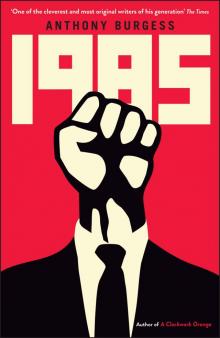 1985
1985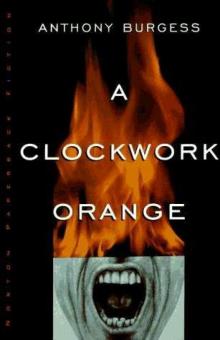 A Clockwork Orange
A Clockwork Orange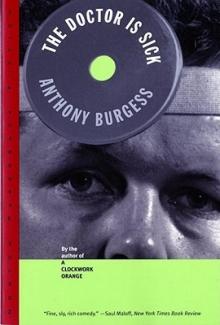 The Doctor Is Sick
The Doctor Is Sick Earthly Powers
Earthly Powers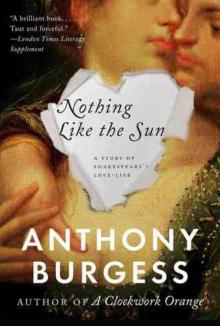 Nothing Like the Sun
Nothing Like the Sun Collected Poems
Collected Poems The Kingdom of the Wicked
The Kingdom of the Wicked The Wanting Seed
The Wanting Seed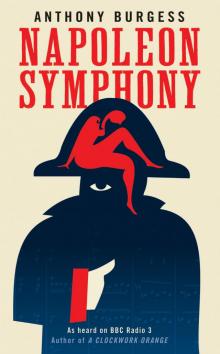 Napoleon Symphony
Napoleon Symphony The Malayan Trilogy
The Malayan Trilogy A Long Trip to Teatime
A Long Trip to Teatime Enderby Outside
Enderby Outside M/F
M/F The Complete Enderby
The Complete Enderby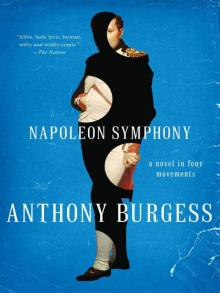 Napoleon Symphony: A Novel in Four Movements
Napoleon Symphony: A Novel in Four Movements Enderby's Dark Lady
Enderby's Dark Lady The Clockwork Testament (Or: Enderby 's End)
The Clockwork Testament (Or: Enderby 's End) ABBA ABBA
ABBA ABBA A Clockwork Orange (UK Version)
A Clockwork Orange (UK Version)